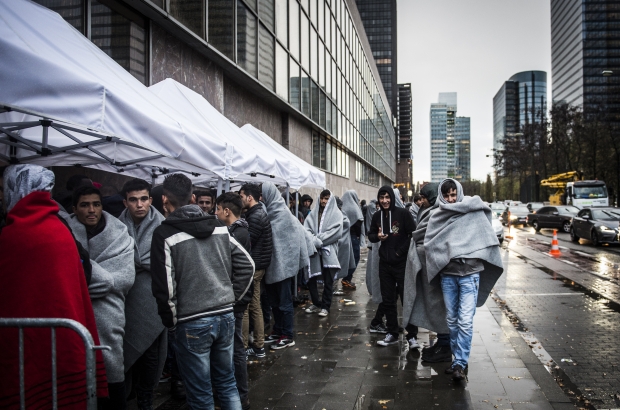- Daily & Weekly newsletters
- Buy & download The Bulletin
- Comment on our articles
Asylum crisis: Belgium may have left minors sleeping on the streets this week
Belgium’s refugee crisis may have reached a new low point, as evidence suggests a lack of available shelter space resulted in minors sleeping on the street this week.
An estimated 21 young people were turned away from refugee reception points, Bruzz reports, and seven of them have since "disappeared from the radar" following a continued lack of solution.
“Our hearts really ache for that, because they are very susceptible to exploitation and abuse,” said Tine Claus, director of refugee association Vluchtelingenwerk Vlaanderen.
Fourteen of the 21 young people were referred to a public service in order to have their actual age determined. Belgian authorities have said that many refugees claim to be younger than they really are in order to obtain better asylum benefits.
Tests to determine age have been viewed as controversial, and candidates who are not obviously minors are required to wait until the results of such tests before being offered shelter.
Afterwards, these individuals were taken to a day shelter but it is not known where they spent the night.
“At the end of the day, this centre closes,” explained social worker Lorenzo De Lucia.
“We brought them together to look for solutions with institutions and civil society organisations, but we couldn't find any. As a result, these young people were left to their own devices at the end of the day, probably forced to sleep on the streets.”
Belgium has been officially condemned at least 4,500 times since the start of the year for failing to provide shelter to asylum seekers, but many are pointing to this as especially appalling.
Claus said that given their young age, they are more likely to end up falling prey to sex trafficking, and that increasingly cold weather adds additional dangers.
“This is really not acceptable, [but] it’s been a long time coming, as last year the situation was already alarming,” Claus said.
“For more than a year, single men applying for asylum have ended up on the streets, already at least 5,000 people have been denied access to the reception network. We have been in crisis mode for some time, but now we have reached a low point.”
The Belgian government has opened emergency shelters to deal with the influx of refugees that followed the US exit from Afghanistan and the war in Ukraine, but the number of people seeking asylum has completely overwhelmed the system.
Claus advocates for housing refugees in hotels, which has already been done for Ukrainian refugees specifically.
Belgium says that extraordinary efforts are being made to accommodate refugees, but that these numbers are the highest the country has had to cope with since the crisis of 2015.
“It’s not because we don’t want to create additional places, but because we are unable to do so due to a lack of human resources,” said secretary of state for asylum and migration Nicole de Moor (CD&V).
In a joint press release, the Ecolo and Groen parties expresesed dismay and demanded that “emergency places in private accommodation (hotels, youth hostels, etc.) be offered immediately” for the most vulnerable people.
But de Moor said this “isn’t so easy”, as staff would still be needed to accompany the minors and that without those human resources, they would be left with no support.
An urgent application was lodged with the European Court of Human Rights on Thursday, aiming to remind Belgium once again of its obligation to provide housing for refugees.
“We believe that leaving minors on the streets is tantamount to exposing them to inhumane and degrading treatment, which contravenes human rights and the rights of the child,” said social worker Lorenzo De Lucia.
Other at-risk individuals – who normally are given priority for shelter – include single women and families with children, many of whom are said to still be without accommodation.
Fedasil said it had to turn away 125 such people on Thursday morning, prompting outcry from NGOs who again suggest that hotel rooms be offered.
“This is an emergency solution,” Mieke Candaele, communications director at Fedasil, told Belgian media.
“We have asked NGOs to help us not only with the reception of the people but also with the personnel. There is a structural problem at Fedasil, but also at our traditional reception partners, to find staff, which explains why we cannot open certain reception places.”
De Moor presented potential solutions at the beginning of the week, including increasing capacity to avoid people sleeping on the street, but reiterated that the government was lacking staff.
“I have already asked several times for support in terms of staff, but so far my requests have not been met,” de Moor said.
The crisis has pushed more asylum seekers into Brussels squats, which are often unsafe and now, with the onset of autumn, dangerously cold.
Médecins Sans Frontières (MSF) regularly visits six Brussels squats for medical consultations and is warning that there are more minors among the refugees taking shelter there.
“We used to see one or two unaccompanied minors per visit, while now there are on average 10 per squat,” said MSF’s Anne-Sophie Loobuyck.
“We see a clear increase in minors and single men who have filed for asylum but have no shelter. This has been the case since August.”
Some squats have as many as 50 refugees living there. More than 200 squatters are living in an old factory in Molenbeek after reaching an agreement with the building’s owner.
“We are monitoring a total of 700 people in some recognised occupancies,” said François Bertrand, director of Bruss'Help, which works to help the homeless.
“They are mainly undocumented migrants and people entitled to international protection. Until before the summer, that distribution was about 50:50. But since September we have seen a sharp rise in the number of asylum seekers: they now make up three-quarters of the occupiers.”
















